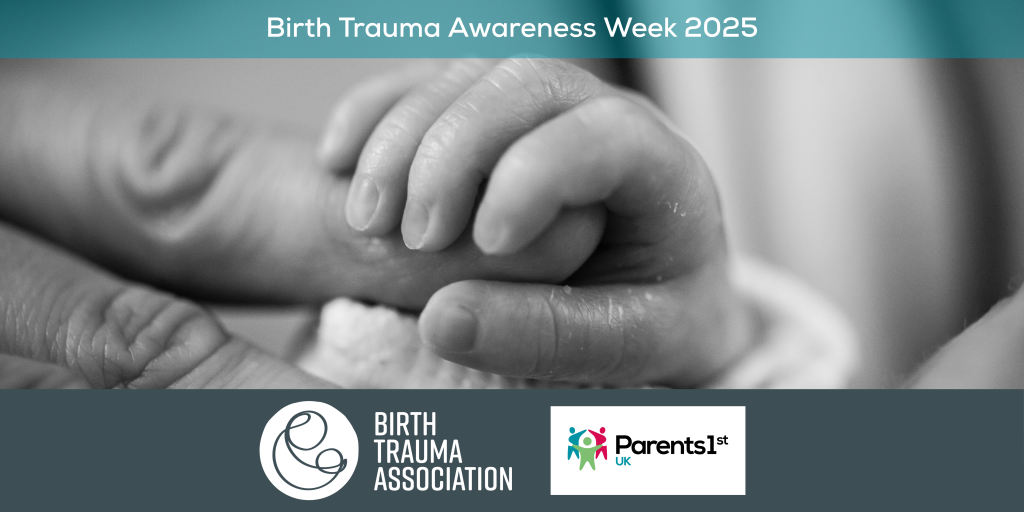Birth Trauma Awareness Week (July 14th-20th, 2025) is a time to amplify the voices of those affected by traumatic birth experiences and to raise awareness of the long-term emotional impact that can follow.
At its core, birth trauma is a term used to describe the psychological distress someone may feel after experiencing—or witnessing—a traumatic birth. This trauma can affect anyone involved in the birthing process: mothers, partners, and even healthcare providers.
________________________________________
What Is Birth Trauma?
Birth trauma doesn’t just refer to a physically difficult birth—it includes emotional and psychological trauma. A birth might be traumatic for many reasons: a loss of control, not being listened to, unexpected interventions, fear for your or your baby’s life, or medical complications. For some, the effects of that trauma can be severe enough to meet the criteria for Post-Traumatic Stress Disorder (PTSD).
________________________________________
PTSD After Birth: How Common Is It?
Research shows that around 4–5% of women develop PTSD after birth. That’s an estimated 25,000–30,000 women each year in the UK alone.
PTSD symptoms fall into four main categories:
• Re-experiencing the trauma: You might have nightmares or flashbacks that bring the birth back in vivid detail.
• Avoidance: You may try to avoid anything that reminds you of the birth—like returning to the hospital or watching birth-related TV shows.
• Hyperarousal: Feeling constantly on edge, easily startled, or as if something terrible is going to happen.
• Negative changes in thoughts or mood: Feelings of guilt, shame, low mood, or trouble remembering aspects of the birth. Some people with PTSD also experience dissociation—a sense of emotional numbness or detachment from reality.
________________________________________
Not PTSD—But Still Trauma
A much larger group of people experience trauma symptoms that don’t meet the threshold for PTSD but are still very real and impactful. These may include high anxiety, panic attacks, or disturbing memories of the birth. We use the term “birth trauma” to describe all these experiences.
________________________________________
Struggles with Bonding
It’s very common for people who’ve had a traumatic birth to find it hard to bond with their baby, especially in the early days. For some, the baby becomes a reminder of what happened. If this is your experience, you are not alone—and it doesn’t mean you aren’t a good parent. The truth is: connection takes time, especially after trauma. Even if you don’t feel the “rush of love” you expected, you may still be doing a wonderful job caring for your baby. With the right support, that bond can and often does grow stronger. ________________________________________
Birth Partners Can Experience Trauma Too
It’s not only mothers who are affected. Around 1% of dads or birth partners may develop PTSD after witnessing a traumatic birth. Many others experience trauma-related symptoms that can impact their mental health, relationships, and confidence. We must include and support partners in these conversations—and in the healing process.
________________________________________
You Are Not Alone
If you or someone you know is struggling after a traumatic birth, know this:
• Your feelings are valid.
• You're not overreacting.
• Help is available, and recovery is possible. Talking to others with similar experiences, reaching out to a therapist, or accessing peer support groups can be life-changing.
Let’s use Birth Trauma Awareness Week 2025 to break the silence, reduce stigma, and advocate for better care and understanding—for every parent, every family, and every birth story. ________________________________________
💬 Need Support?
Here are some great resources recommended by the Birth Trauma Association:
Websites
Bliss offers support for parents and families of premature and sick babies.
North London-based charity offering counselling to women in the perinatal period.
Five X More campaigns for better outcomes in maternity for Black women.
Make Birth Better also supports parents affected by birth trauma as well as professionals affected by vicarious trauma. Their email is staffed by mental health professionals (psychologists and a psychiatrist).
MASIC supports people who have experienced injuries as a result of birth.
PANDAS supports parents with prenatal or postnatal depression, as well as other perinatal mental health challenges. Its helpline is open Monday to Friday between 10am and 5pm.
PEEPS supports parents, families and friends of people who have experienced hypoxic-ischaemic encephalopathy (brain injury as a result of oxygen deprivation). It has lots of useful downloadable resources.
SANDS offers support to parents whose baby has died, whether that happened recently or long ago.
Books
Breaking the Taboo: Why we need to talk about birth trauma by Theo Clarke
Coping with birth trauma and postnatal depression by Lucy Jolin
Birth Shock: how to recover from birth trauma by Mia Scotland
Why birth trauma matters by Emma Svanberg
Birth Trauma: A guide for you, your friends and family to coping with post-traumatic stress disorder following birth by Kim Thomas
Postnatal PTSD: A Guide for Health Professionals by Kim Thomas with Shona McCann
You can also request Peer Support from us here: https://parents1st.org.uk/essex-peer-support-services


